The World Bank has issued a brief on costing a Tech-EnableD Disability Inclusive Education (TEDDIE) Intervention. TEDDIE is an instrument comprising a costing tool and an implementation toolkit to help policy makers estimate the cost of procuring, utilizing, and maintaining an intervention that leverages technology to support learners with disabilities.
Blog
[Factsheet] International Women’s Day: Investment in girls’ and women’s education
UNESCO’s fact sheet – Investing in girls’ and women’s education: A smart investment to accelerate development – released for International Women’s Day shows investment in girls’ education has generated huge dividends over the past two decades. There are now fewer girls (122 million) out of school than boys (128 million) and according to the most up-to-date figures, 114 women are enrolled for every 100 men in higher education worldwide. Behind the global figures, however, stubborn pockets of exclusion remain. The ten countries with the highest out-of-school rates for girls are all in Africa apart from Afghanistan. In eight of them, over half of school-aged girls are out of school; in Afghanistan, 75% of girls are out of school.
Read UNESCO’s blog, International Women’s Day: Investment in girls’ education pays off.
[Podcast] Episode 2 (Arabic) Inclusive Education: Unheard Stories
- Watch on YouTube (Arabic).
- Listen on SoundCloud (Arabic).
- Read the transcript as a blog (English).
- Visit EENET’s Arabic language website.
[Resource] Activity cards for inclusive sports
Activity Alliance has released a series of activity cards designed to help deliver high-quality inclusive sports activities. Each set of cards is packed with fun games and activities, with adaptions available based on Youth Sport Trust’s STEP method. These are designed for sports clubs and community groups but might inspire teachers or help with fun activities.
[Blog] Zero Project Awardees 2024 – inclusive education and ICT
The ZERO Project is a global, research-driven initiative to support the implementation of the Convention on the Rights of Persons with Disabilities. In February it announced the winners of the Zero Project Award. It details 77 solutions from 43 countries around Inclusive Education and ICT.
Awardees include:
- the Timwerenge 365 Digital Book Project, a project in Malawi that uses digital books with sign language and audio for all children;
- the White Hands Chorus Nippon, an inclusive youth choir making music incorporating sign language in Japan;
- the Karachi Down Syndrome Programme in Pakistan that enables young children with Down syndrome to attend mainstream schools;
- a Turkish accessible education system with audio and tactile inclusive materials;
- Mais Diferencas, a training course for teachers on how to use the arts to make education practices inclusive in Brazil.
[Report] Out of School: Assessment on barriers to school enrolment for Ukrainian refugee adolescents in Poland
Since February 2022 it is estimated that more than half of Ukrainian children have been displaced by the war. About 950,000 Ukrainians have fled to Poland. Save the Children has published a report that aims to better understand the impacts of Ukrainian adolescents’ participation in the Polish school system, including barriers to entering Polish schools, push-pull factors that may inhibit enrolment, what support or coping mechanisms are used when children and adolescents don’t attend school in person, as well as what strategies might support enrolment in Polish education and resilience of Ukrainian children and adolescents.
Supporting Students in Gaza
By Dr. Mohammed Awad Sabhair
This blog is a slightly adapted transcript of a podcast – episode 2 of EENET’s “Inclusive Education: Unheard Stories” series. The podcast is available in Arabic.
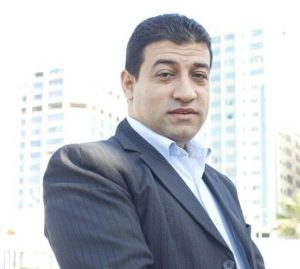
Introduction
I am Dr. Mohammed Awad Sabhair, a volunteer activist in the educational community. I hold a Ph.D. in Educational Administration, a Bachelor’s degree, and a Bachelor’s degree in Psychology. I work as a director and a distinguished school supervisor at Al-Aqsa University in the Gaza Strip. I am actively involved in the Arab and global campaigns for education for all and the Palestinian Educational Coalition.
I am also the founder of the Pulse of Peace Association for Mental and Community Health, a mental health first aider in times of crisis, and a certified educational and community trainer within the Gaza Strip. I am involved in various civil, private, and popular voluntary institutions. I am a member of the Community Accountability Committee in Gaza and a researcher with numerous published research papers, studies, articles, and diverse writings locally and regionally.
My current situation
I am in Khan Yunis Governorate, southern Gaza. We were told by the Israeli forces to evacuate our homes due to the precarious situation. We find ourselves in a dire situation, facing inhumane conditions with a complete lack of services. The harsh winter conditions surround us. This area is also close to the Rafah border, where over a million and a half people are cramped in a small space, lacking essential services.
There are insufficient words to describe the scene in the displacement area where my family and I are located. It is almost impossible to convey the complete picture. We are experiencing power outage for over three months, no communication or internet services due to the destruction of the communication network. There is a complete lack of water services due to the destruction of underground networks. We resort to primitive methods to obtain and transport water.
Transportation services are entirely halted, fuel is scarce, and essential goods are absent. If available, prices have skyrocketed. Special medications for children, women, the elderly, and pregnant women are unavailable. People are suffering with difficult health conditions. There is a shortage of basic goods, and tents, blankets, and winter clothes are unavailable. The local stock of water, livestock, crops, and goods is depleted due to the lack of entry of supplies.
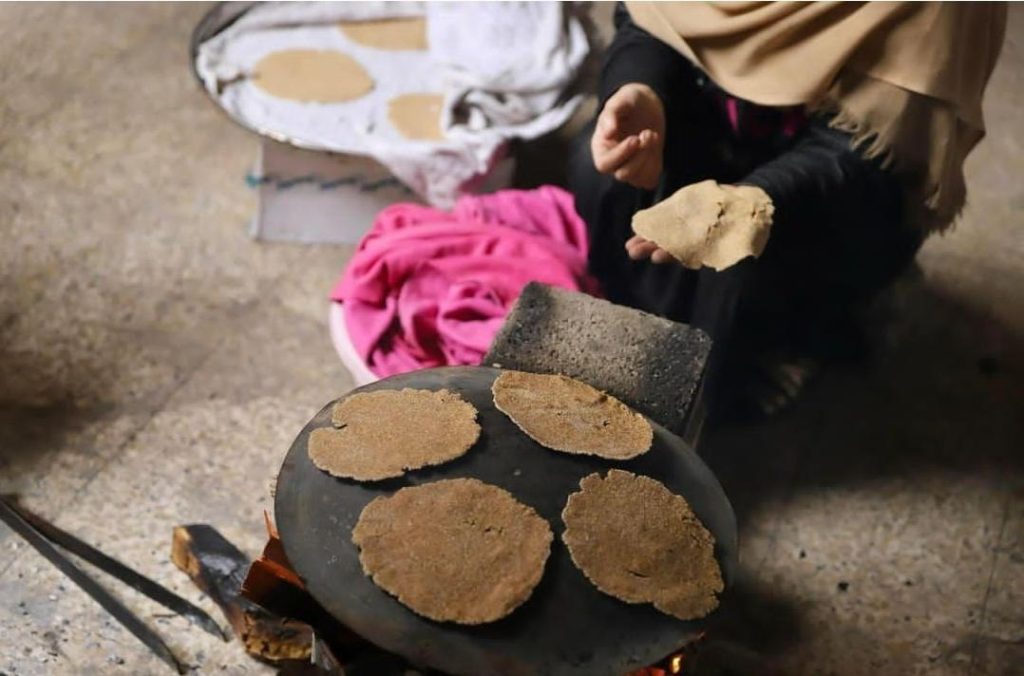
Living under siege
Daily life is severely impacted by the complete closure of land crossings, a comprehensive naval blockade, full control of the airspace, and continuous airstrikes and destruction throughout the day. As night falls, fear and anticipation take over, and in the pitch-black darkness, movement becomes impossible due to reconnaissance aircraft hovering above.
The continuous shelling of coastal areas by naval vessels adds to the danger. As I write this message, the sound of shelling intensifies. In the face of these conditions, we are lost, not knowing where the circumstances will lead us or how to meet the needs of our families and children.
My children, who now ask questions and engage in discussions, are met with silence from us adults in the face of the crisis and the catastrophe we are living through day and night.
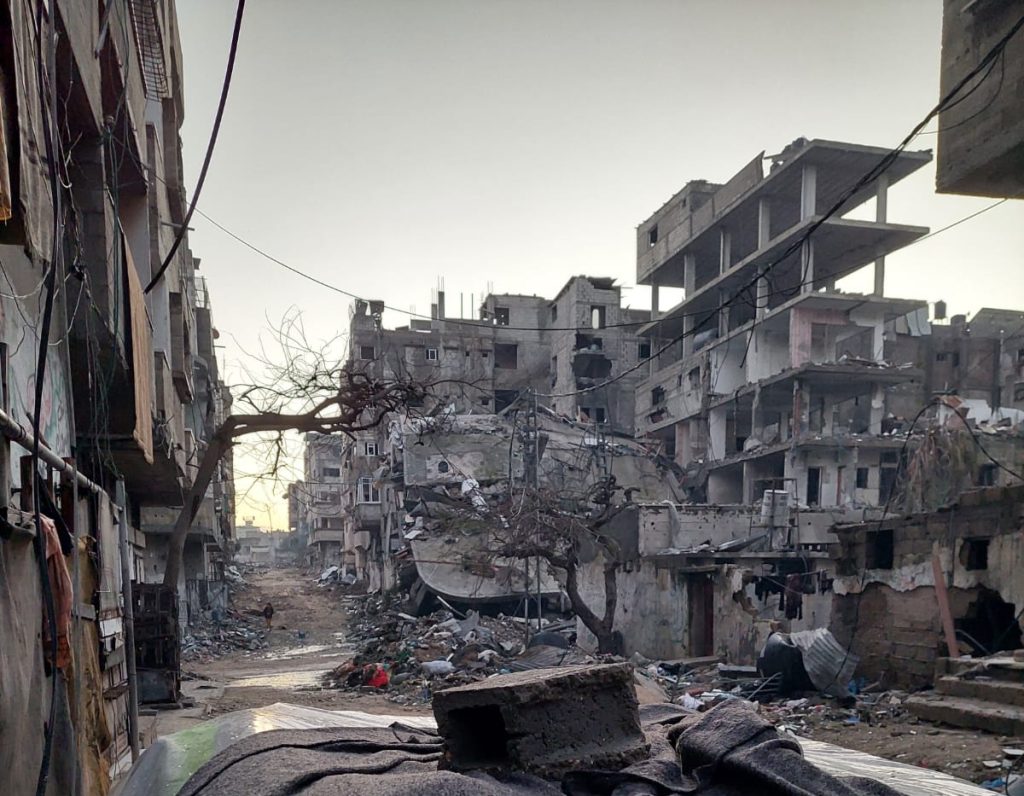
The education situation up to October 2023
Around 650,000 students were enrolled in education in Gaza. Supervision of education was shared among the Ministry of Education, the Palestinian Education Authority, the UN Relief and Works Agency (UNRWA), and private schools. In Gaza, before this war, 750 schools were operating on a two-shift system due to the high student density. The political division imposed by Israel since 2007 led to a comprehensive blockade affecting all aspects of life until 2023. This has caused significant destruction in all areas, particularly in education.
The conditions for teachers and educational staff were extremely challenging. They did not receive their salaries regularly, and delays in payment led to a loss of motivation, forcing them to seek additional employment to meet their needs. The severe poverty and unemployment experienced by parents also affected students, as many parents were compelled to send their children to work to support their families.
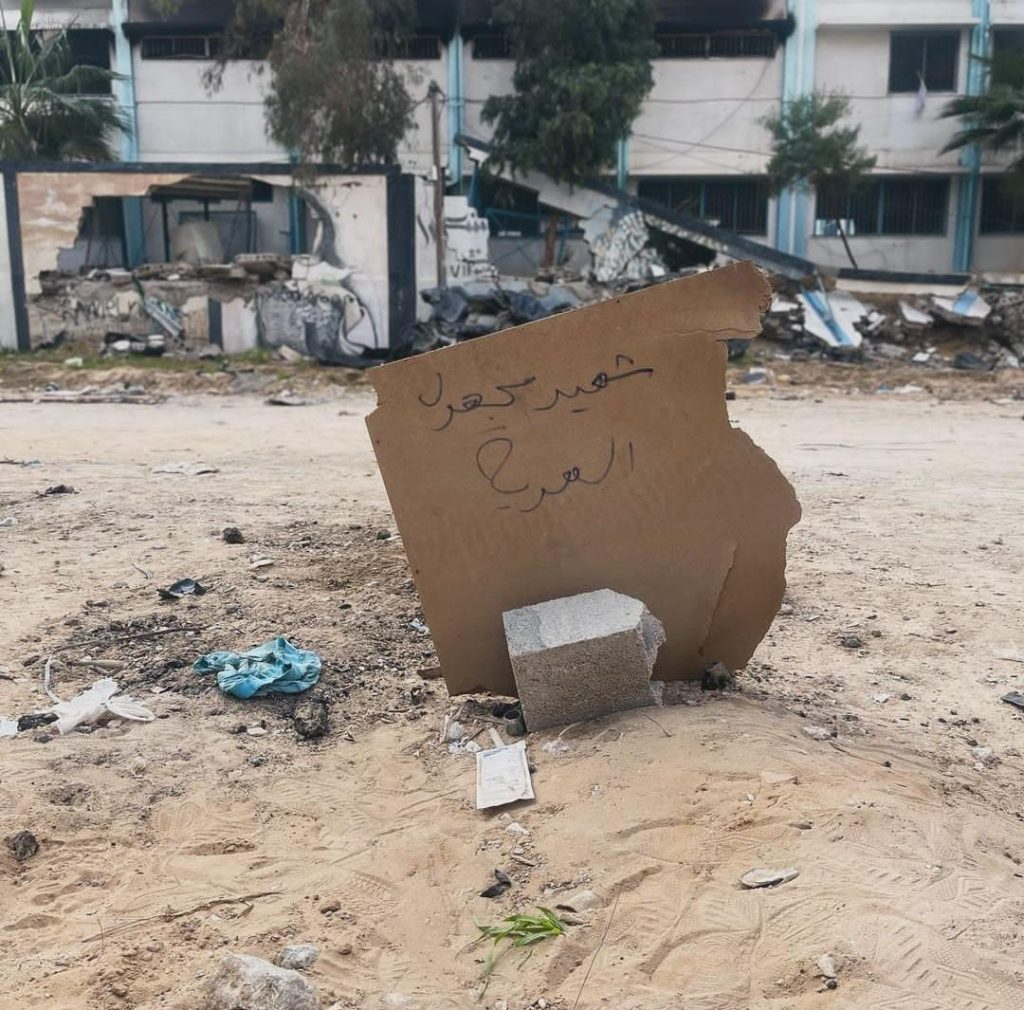
The impact of war on education
Then came the latest war on Gaza in October 2023, where Israel terminated all agreements, treaties, and conventions calling for the protection of the right to education and the preservation of educational institutions and facilities without harm or disruption. As of now, the education sector has reached a point of complete destruction and collapse due to Israeli practices, including the brutal and genocidal war.
The numbers attest to the difficult situation: 4,119 students have been killed and 75,000 students wounded. Additionally, 221 teachers and administrative staff working in the ministry have been killed and 703 injured. Furthermore, 83 schools have suffered severe damage, seven schools have been completely destroyed, and 278 schools require major maintenance. Also, 65 schools affiliated with UNRWA have been damaged. The Ministry has indicated that 90% of school buildings have been directly or indirectly damaged.
All schools in Gaza – whether under the Ministry of Education, UNRWA, or private institutions – have been turned into shelters for displaced people fleeing Israeli attacks. The situation is dire, with schools that were once able to accommodate 2,000 students now housing 9,000 displaced individuals. Other schools have been subjected to theft, vandalism, and looting of school furniture, which is sometimes used as fuel for cooking due to the lack of fuel and cooking gas.
There has been direct targeting, arrest, and displacement of many people, including those managing the shelters. In light of these figures and this grim scene, the education sector in Gaza has reached a point of complete destruction and collapse. No local entity can provide any services for education in the near or distant future without a halt to the war and the intervention of a state to rebuild the education sector, including schools, universities, and kindergartens.
Supporting students
Students have developed psychological symptoms, manifested in severe fear, constant anxiety, various behavioural problems including involuntary urination, night terrors, withdrawal, intense crying, constant panic, clinging to parents, difficulty sleeping, reluctance to participate in group activities, loss of passion, absence of hope, feelings of guilt, constant self-doubt, and frustration, as well as various health issues and emotional numbness.
Through my work in shelters and displacement centres, I see this vivid reality that we experience every day with the children and their families. We strive to provide first-level psychological and social support services to children and their families to alleviate fear and provide temporary stability. We collaborate with the Teacher Creativity Center to offer socio-emotional learning services to children in shelter centres, helping them stay connected with various educational skills and make up for what they missed during the past three months of the war.
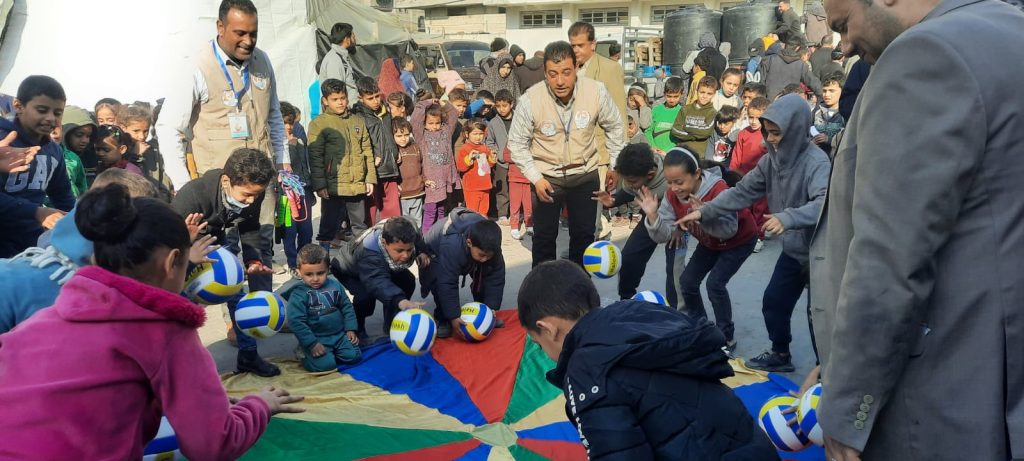
Several youth and volunteer initiatives and organisations try to provide play services, support, and distribute gifts to children and students to alleviate their suffering. The distribution of some guidance manuals for parents on first aid for psychological care, child protection, emergency education times, and emotional support is ongoing.
What we witness is extremely dangerous and challenging. However, we believe it is our duty to uphold the right to education and learning during emergencies, and to be present to provide humanitarian services to students and children, guiding parents on providing education based on available resources and under difficult circumstances.
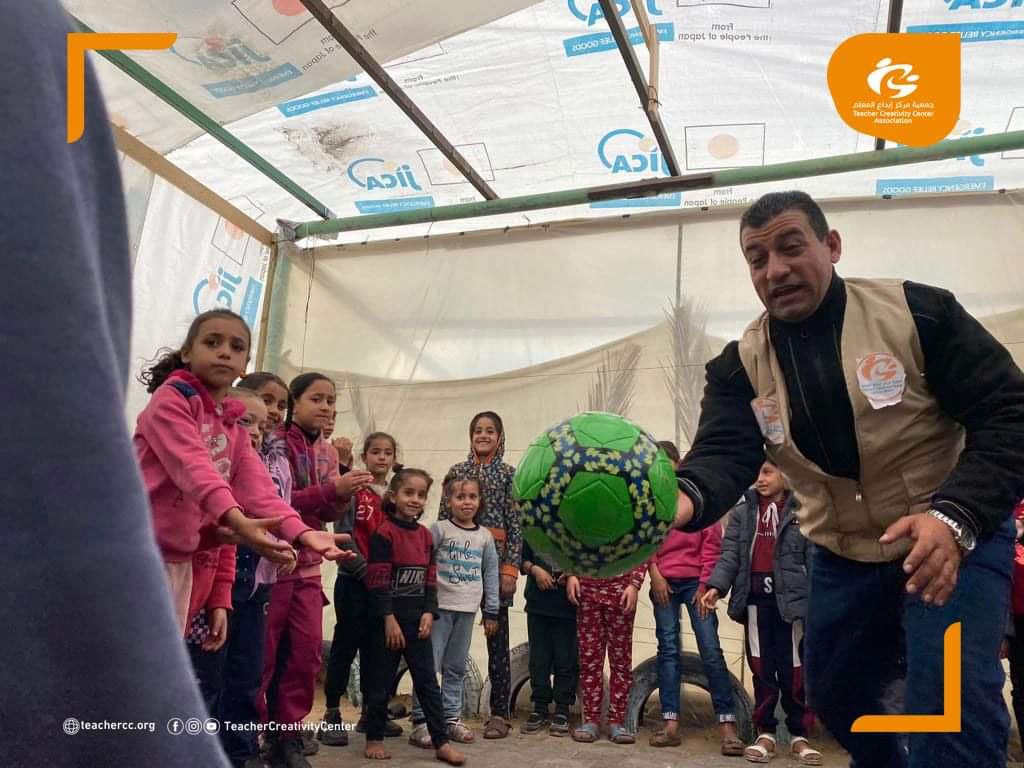
Looking ahead
Many questions remain unanswered from parents and children. When will the war end? Is there a ceasefire? What happened to my father who was arrested by the Israeli army? Will we return to our school? What about our teachers and classmates who were killed in this war? Where is our home, and in which house? How can we make or find food? I want to buy clothes; we need a tent to live in. Faced with these questions, we stand helpless, as there are no answers to these questions. No countries in the world can answer them in the face of the might and aggression of the Israeli war machine.
Everyone’s hope for a future life has been shattered, as the students reported when asked about their outlook for the future. Their responses were heartbreaking:
“There is no future; the future is gone. There is no hope.”
This is the language of children, and I convey it to you. We stand together to protect our students and keep the flame of their right to education, towards providing sustainable, equitable, and dignified education for all. We will not leave anyone behind due to the atrocities of the Israeli war.
I wish you a day and times filled with hope and peace.
[Webinar] Understanding MHPSS and Situational Analysis in Gaza
Date: 5 March 2024.
Time: 13:00 – 14:30 UTC (GMT).
Location: online.
The webinar is hosted by INEE and is a follow-up to their webinar on the right of education in Gaza. The webinar aims to foster a safe space to hold a conversation around the unprecedented mental health and psychosocial support situation (MHPSS) in Gaza and catalyze efforts to address the mental health and psychosocial needs of the population affected by the war. The complex socio-political situation, compounded by recurrent conflicts and humanitarian crises, has significantly impacted the mental well-being of individuals, especially children and their caregivers. To effectively start to respond to these challenges, a conversation on a situational analysis of the MHPSS landscape is important to initiate by INEE as a global network. The webinar features local voices and representatives from UNRWA, UNICEF, the Education Cluster, Creative Associates International, among others.
[Webinar] Silence of universities and academic associations during times of genocide
Date: 5 March 2024.
Time: 17:00 – 18:30 CET.
Location: online.
The webinar asks: What is the responsibility of universities, professional associations, academics and students to speak out against genocidal atrocities occurring in Palestine and in other contexts? In this webinar, speakers will reflect on the silence and complicity of academia during times of genocide, and together, speakers and participants will discuss practical measures to mobilise against such atrocities. The webinar is hosted by the University of Cambridge.
[Webinar] INEE Community of Practice ‘show and tell’
Date: 26 February 2024
Time: 11 AM London
Location: Online.
The Inter-agency Network for Education in Emergencies has a Community of Practice (CoP), which has become its principal engagement platform for INEE members to share knowledge. The Show & Tell event is an opportunity to learn more about the CoP and make the most of what it offers. In about an hour, INEE will provide an overview of the INEE CoP, take participants on a guided walkthrough of the Slack-based platform, and lead them through a few practical exercises on the platform. Members and non-members of the CoP can join the event.
